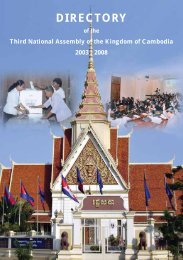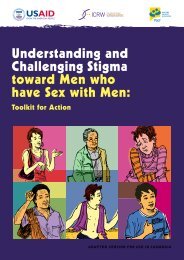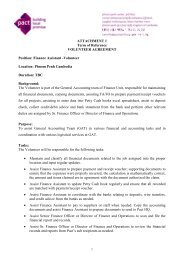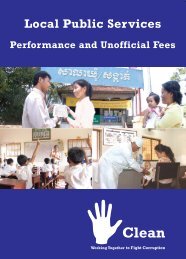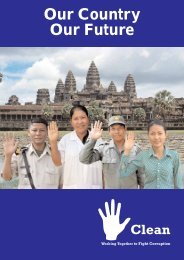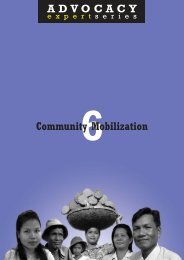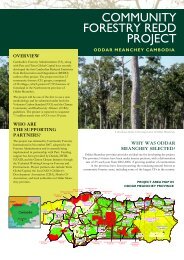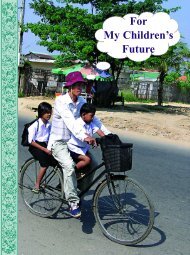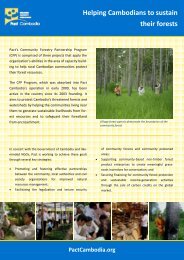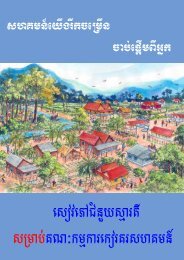Advocacy in Cambodia: Increasing Democratic ... - Pact Cambodia
Advocacy in Cambodia: Increasing Democratic ... - Pact Cambodia
Advocacy in Cambodia: Increasing Democratic ... - Pact Cambodia
Create successful ePaper yourself
Turn your PDF publications into a flip-book with our unique Google optimized e-Paper software.
EMOs do not<br />
traditionally base their<br />
work on popular<br />
support. Their<br />
legitimacy stems from<br />
the documentation of<br />
rights or election<br />
violations and<br />
proposed work to solve those violations. In order<br />
to build legitimacy for the campaign to switch<br />
Commune Councils elections to direct vot<strong>in</strong>g, the<br />
EMO coalition established legitimacy by<br />
conduct<strong>in</strong>g public polls. The 80% support for the<br />
direct system surprised the EMO coalition and<br />
provided a strong factual foundation for their<br />
campaign, even though the f<strong>in</strong>d<strong>in</strong>gs and the EMOs<br />
advocacy activities did not conv<strong>in</strong>ce politicians to<br />
change the draft law. Anecdotes suggest that highlevel<br />
politicians <strong>in</strong>timated to the EMOs that even<br />
though the campaign platform had popular<br />
support, the EMOs themselves did not have<br />
enough popular support. NGOs should realize that<br />
significant campaign strength would result from<br />
both broad based support for the issue as well as<br />
for the NGOs that help organize the campaign.<br />
Among the cases reviewed there are three <strong>in</strong><br />
which support of constituents was cultivated:<br />
labor, the fisheries sector, and the rights of<br />
commercial sex workers. Fisheries advocates used<br />
two strategies to <strong>in</strong>clude fish<strong>in</strong>g communities <strong>in</strong><br />
policy formulation. The first was to share drafts<br />
of the community fisheries sub-decree with<br />
representatives of fish<strong>in</strong>g communities and the<br />
second was to obta<strong>in</strong> the participation of<br />
community representatives at national level<br />
conferences to give their <strong>in</strong>put to the draft decree.<br />
Experts <strong>in</strong> natural resources management contend<br />
that policies formulated us<strong>in</strong>g this model of<br />
consultation are likely to be more appropriate and<br />
better enforced than models used by other sectors.<br />
The organiz<strong>in</strong>g of commercial sex workers <strong>in</strong><br />
the Phnom Penh area highlights the power of<br />
participatory advocacy. <strong>Advocacy</strong> focused on<br />
<strong>in</strong>form<strong>in</strong>g commercial sex workers that their<br />
profession is not illegal and that police and other<br />
officials are act<strong>in</strong>g illegally when they deta<strong>in</strong> and<br />
abuse them. The 1,900 organized commercial sex<br />
workers have learned to react quickly when one<br />
of their own is taken to a police station: as a group,<br />
they immediately protest the illegal deta<strong>in</strong>ment.<br />
Labor organiz<strong>in</strong>g has directly <strong>in</strong>cluded<br />
garment factory workers as members and leaders.<br />
Labor union meet<strong>in</strong>gs <strong>in</strong>clude agenda sett<strong>in</strong>g by<br />
members and democratic decision-mak<strong>in</strong>g with<strong>in</strong><br />
some unions.<br />
Some advocacy campaigns understand the<br />
importance of <strong>in</strong>clud<strong>in</strong>g afftected communities <strong>in</strong><br />
campaign activities. The HIV/AIDS sector is a<br />
While not all advocacy issues require mass<br />
organiz<strong>in</strong>g, <strong>in</strong> order to ma<strong>in</strong>ta<strong>in</strong> their legitimacy<br />
advocacy or policy formulation agencies need to<br />
ma<strong>in</strong>ta<strong>in</strong> some ties to the grassroots level.<br />
good example where HIV positive people are be<strong>in</strong>g<br />
mobilized to have a voice <strong>in</strong> policy formulation.<br />
The more affected communities are <strong>in</strong>corporated<br />
<strong>in</strong>to the campaign, the greater the possibility of<br />
hav<strong>in</strong>g a legitimate campaign that holds long-term<br />
potential to br<strong>in</strong>g about positive change.<br />
The Role of NGOs and Direct Action<br />
This last example illustrates a subtle trend <strong>in</strong><br />
grassroots advocacy <strong>in</strong> <strong>Cambodia</strong>. International<br />
agencies are <strong>in</strong>creas<strong>in</strong>gly question<strong>in</strong>g the ability<br />
of some NGOs to <strong>in</strong>clude communities <strong>in</strong> advocacy<br />
activities. Even more seriously, these agencies<br />
appear doubtful that those NGOs can develop<br />
advocacy skills. In response they are test<strong>in</strong>g<br />
community advocacy models that bypass NGOs<br />
and work directly with affected communities and<br />
advocate leaders.<br />
A comb<strong>in</strong>ation of factors are likely<br />
responsible for this trend. To beg<strong>in</strong> with, the<br />
context <strong>in</strong> which rural NGOs are work<strong>in</strong>g is<br />
particularly challeng<strong>in</strong>g and they may not have<br />
adequate back<strong>in</strong>g to undertake difficult campaigns<br />
that challenge the status quo. Unlike other<br />
countries with strong grassroots advocacy<br />
movements, most NGO workers <strong>in</strong> <strong>Cambodia</strong> do<br />
not come from a background of activism and they<br />
lack the commitment of activists. There are also<br />
a number of reported cases of NGO workers<br />
replicat<strong>in</strong>g with communities the same statusconscious<br />
or paternalistic behavior that target<br />
stakeholders (such as authorities or company<br />
managers) subject the communities to – and<br />
consequently alienat<strong>in</strong>g themselves from<br />
communities.<br />
When politicians are known to be corrupt and<br />
the rule of law is not upheld, small NGOs with little<br />
clout are not <strong>in</strong> a position to obta<strong>in</strong> solutions to<br />
problems or even strong advocacy networks, such<br />
as the KANAN <strong>in</strong> Kompong Cham. In some cases<br />
NGOs have been help<strong>in</strong>g communities file<br />
compla<strong>in</strong>ts and collect petitions for years, but<br />
without success. In at least one case <strong>in</strong> Kompong<br />
Thom, an NGO worker was killed <strong>in</strong> the course of<br />
advocacy activities. Recently <strong>in</strong> Preah Vihear, one<br />
NGO worker was threatened at gunpo<strong>in</strong>t. NGO<br />
workers are periodically warned by armed guards<br />
not to enter certa<strong>in</strong> areas where land and forest<br />
concessions are reported to be problematic. In<br />
1999, two LICADHO staff were arrested <strong>in</strong><br />
Increas<strong>in</strong>g <strong>Democratic</strong> Space<br />
21



